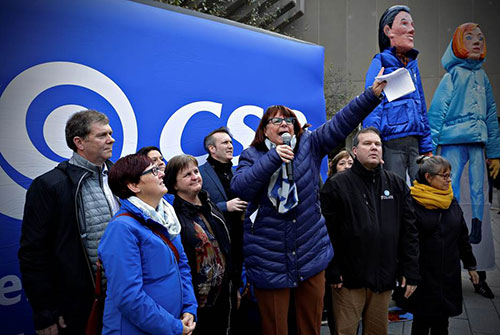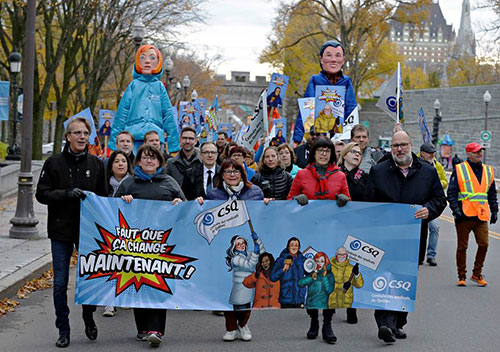CSQ MAGAZINE: WHAT DOES SOCIETY HAVE TO GAIN FROM THIS NEGOTIATION?
Sonia Ethier: The entire population has suffered a great deal from the Couillard government’s austerity measures. Services were cut, across all sectors, particularly in education as well as health and social services. The entire population was short-changed.
WHY SHOULD THE POPULATION SUPPORT PUBLIC SECTOR EMPLOYEES?
Employees of the public sector are fighting to improve their working conditions, but also to improve the quality and accessibility of public services. As such, the better their working conditions, the more the services rendered will meet the population’s needs.
 HOW CAN BETTER WORKING CONDITIONS IMPROVE THE QUALITY OF PUBLIC SERVICES?
HOW CAN BETTER WORKING CONDITIONS IMPROVE THE QUALITY OF PUBLIC SERVICES?
Quite often, improving working conditions involves giving workers the means to fulfill their work for the population. Nothing is as challenging for the education personnel, as well as those in the health and social services sector, than having to compensate for the lack of staff and resources to do their job properly. There lies the increasingly difficult task of retaining current personnel or attracting a new generation to the public sector.
DOESN’T THE POPULATION HAVE MORE TO GAIN THROUGH INCOME TAX CUTS THAN IMPROVED PUBLIC SERVICES?
What good do small income tax cuts do if citizens are forced to turn to the private sector to get the services they are entitled to?
Turning to the private sector entails outrageous costs, when public networks have the necessary expertise to teach and care for the general public. Tax cuts can be very enticing and pleasing in the short term, but they don’t serve the interests of the population in the medium and long term.
A government that decides to under-finance public services in order to give income tax cuts weakens and jeopardizes the services offered to the population. The people of Québec believe in their public networks because they recognize that through them, they can access quality healthcare and education services, regardless of their income. This level playing field is one of the fundamental values we hold dear.
"It's simple. Things as they are cannot go on. Things need to change now!"
CAN THE POPULATION’S SUPPORT INFLUENCE THE OUTCOME OF THE NEGOTIATIONS?
The support of the population is very important. Governments are highly aware of public opinion. Hence the importance of effective communication with the public, to clearly state our demands so they can have a better understanding of the real issues at stake which, ultimately, impact their lives as well. We, the workers, have but one desire: to secure working conditions that will allow us to provide the best possible services to everyone.
WHAT DOES THE CSQ AND ITS MEMBERS PLAN ON DOING TO SECURE THE POPULATION’S SUPPORT?
We will be present, in the public arena and in the media, to explain the state of working conditions in our public networks, and their impact on personnel as well as the services provided to the population. We will endeavour to show how our valid demands are closely linked to the best interests of our fellow citizens.
Our message will be clear and direct: the government has the necessary fiscal leeway to take action. Many surpluses are available. Workers have made significant contributions to these results. Citizens have also done their part, and I think that’s more than enough.
Now is the time for a drastic change of direction so as to restore the quality public services the population is entitled to. The personnel should also be granted salary increases which are much higher than those given during the last negotiations. There is enough leeway and no justification for the government not to listen.
 WHAT WILL YOU SAY TO THE GOVERNMENT TO CONVINCE THEM TO SHOW MORE OPENNESS DURING NEGOTIATIONS?
WHAT WILL YOU SAY TO THE GOVERNMENT TO CONVINCE THEM TO SHOW MORE OPENNESS DURING NEGOTIATIONS?
All bargaining tables must be prepared to negotiate in good faith, as provided for in the Labour Code. The employer will have to listen to the needs of everyone, given that those working in the field know what needs to be done. No one knows what happens on a daily basis in our institutions, whether in the education or health and social services sectors, better than those who work there. It would be in the best interests of employer representatives to listen to what we have to say.
HOW DO THESE NEGOTIATIONS DIFFER FROM THE PREVIOUS ONES?
Essentially, negotiations are very similar from one to the next, as far as proceedings are concerned. However, issues and demands vary.
With respect to the negotiations that are beginning, the improvement of working conditions and the increase in wages are particularly urgent, given that we have endured several years of cuts and cutbacks.
Workers are no longer able to carry our public services while dealing with difficult and unacceptable working conditions. Absenteeism rates for long-term sick leave are the rise for a good reason: current working conditions are making workers sick.
HOW MUCH DOES MEMBER MOBILIZATION MAKE A DIFFERENCE DURING NEGOTIATIONS?
It makes a WORLD of difference. No government can stay indifferent to the solidarity and mobilization of public sector workers. It is the best way to send the government a clear message that we are committed to seeing our demands met and that we are determined to improve our working conditions. The strength of our mobilization also has a significant influence on public opinion in our favour.
WHERE DO THE STRENGTHS OF THE CSQ LIE AS IT UNDERTAKES THESE NEGOTIATIONS?
Our greatest strength, our greatest asset, is our members, their solidarity and their representativeness.
